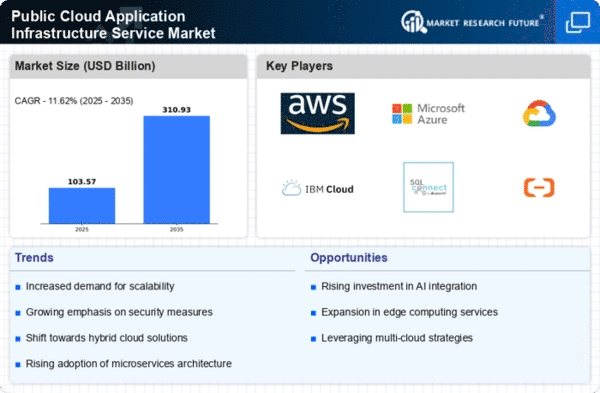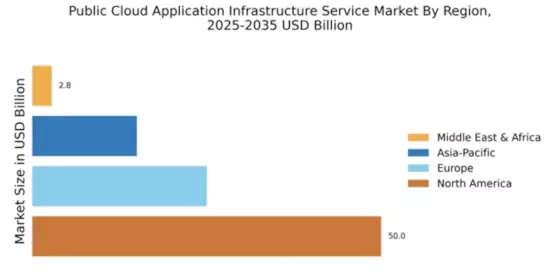North America : Market Leader in Cloud Services
North America continues to lead the Public Cloud Application Infrastructure Service Market, holding a significant market share of 50.0 in 2024. The region's growth is driven by increasing digital transformation initiatives, robust demand for scalable solutions, and favorable regulatory frameworks that encourage innovation. Companies are rapidly adopting cloud services to enhance operational efficiency and reduce costs, further propelling market expansion.
The competitive landscape is characterized by the presence of major players such as Amazon Web Services, Microsoft Azure, and Google Cloud, which dominate the market. The U.S. remains the leading country, supported by a strong technological infrastructure and a high level of investment in cloud technologies. This competitive environment fosters continuous innovation, ensuring that North America maintains its position as a global leader in cloud services.
Europe : Growing Adoption of Cloud Solutions
Europe is witnessing a significant shift towards cloud adoption, with a market size of 25.0 in 2024. The growth is fueled by increasing regulatory support for data protection and privacy, such as the GDPR, which encourages businesses to adopt compliant cloud solutions. Additionally, the demand for remote work solutions and digital services has surged, driving the need for robust cloud infrastructure across various sectors.
Leading countries in this region include Germany, the UK, and France, which are at the forefront of cloud technology adoption. The competitive landscape features key players like IBM Cloud and Oracle Cloud, alongside emerging local providers. This dynamic environment is fostering innovation and collaboration, positioning Europe as a vital player in The Public Cloud Application Infrastructure Service.
Asia-Pacific : Rapid Growth in Cloud Adoption
The Asia-Pacific region is experiencing rapid growth in the Public Cloud Application Infrastructure Service Market, with a market size of 15.0 in 2024. This growth is driven by increasing internet penetration, a burgeoning startup ecosystem, and government initiatives promoting digital transformation. Countries are investing heavily in cloud infrastructure to support their economies and enhance service delivery across sectors, including healthcare and finance.
Key players in this region include Alibaba Cloud and local providers, which are gaining traction due to their tailored solutions for regional businesses. Countries like China and India are leading the charge, supported by favorable demographics and a growing demand for cloud services. The competitive landscape is evolving, with both The Public Cloud Application Infrastructure Service share, ensuring a vibrant cloud ecosystem.
Middle East and Africa : Emerging Cloud Market Potential
The Middle East and Africa region is gradually emerging in the Public Cloud Application Infrastructure Service Market, with a market size of 2.79 in 2024. The growth is primarily driven by increasing investments in digital infrastructure and a rising demand for cloud services across various industries. Governments are actively promoting cloud adoption to enhance service delivery and improve operational efficiencies, creating a conducive environment for market growth.
Leading countries in this region include the UAE and South Africa, which are making significant strides in cloud technology adoption. The competitive landscape features both global players and regional providers, fostering innovation and collaboration. As businesses increasingly recognize the benefits of cloud solutions, the region is poised for substantial growth in the coming years.

















